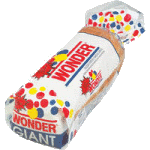Eat to win or for your health?

I was recently working on a story about what to eat during an all-day series of games, matches, heats—the kind of scenario a person would face if they were at a hockey or soccer tournament—when I learned something kinda amazing. While I can’t go into details—the story’s not yet published—the juicy tidbit I can share was that I was shocked when a Registered Dietitian who consults for the US Olympic Team actually told me that swapping out whole grain carbs (bagels, bread, etc.) for white bread (a.k.a Wonder Bread) on the morning of, and throughout a day of, competition is a smart idea. The rationale is pretty simple: white bread goes down like an energy bar. In other words, it’s the bread form of sugar.
As the dietitian explained, the day of competition is not about eating good proteins, fiber, antioxidants, etc. It’s about doing whatever you can to keep your energy stores—specifically, your glycogen stores—topped off and ready to go. Glycogen is the fuel stored in our muscles, and in trained athletes there’s about 90-minutes worth of it to use before they run out of gas, or as we Americans call it, “bonk.”
So the strategy is simple really: hydrate like mad and keep eating super simple carbohydrates that digest quickly and will keep those glycogen stores from running out. And when thinking about Olympic caliber athletes, this makes sense. During the Bejing Olympics, we learned that Michael Phelps needed to eat roughly 12,000 calories a day to perform at his level. I don’t know about you, but if I tried to get all those calories from the salad bar, even if I was a lifelong vegetarian, my gut would explode after 4- to 5,000 calories of roughage.
This isn’t to say that a whole foods diet is bad. My dietitian source did advise me that two days before game day, a person should be getting most of their carbs from whole fruits, vegetables, and whole grains. And I was told that as soon as the tournament ended, a person wants to shovel as many whole foods into them as possible for all the vital recovery nutrients they deliver (vitamins, minerals, antioxidants, fiber, etc.).
And I also learned that the intensity of the day will determine what a person should and shouldn’t eat. A low- to-moderately intense hike, run, or ride does benefit from eating a well-balanced, whole foods diet. We can get away with it because our muscles can spare the bandwidth to digest our food and keep us moving. But those of us racing in Masters swim heats, or playing multiple games of soccer or hoops (and I’d imagine rock climbers would fall into this category as well) will want to stick with the energy drinks, gels, and bars and this heretofore unknown energy food, Wonder Bread.